Ultimate Guide to Free GPT-4.1 API Access: 7 Methods That Actually Work in 2025
With the release of GPT-4.1, developers are eager to integrate this powerhouse AI model into their applications, but the official pricing can be steep for individuals and small teams. This comprehensive guide explores legitimate methods to access GPT-4.1 API for free or at significantly reduced costs, with practical implementation steps for each approach.
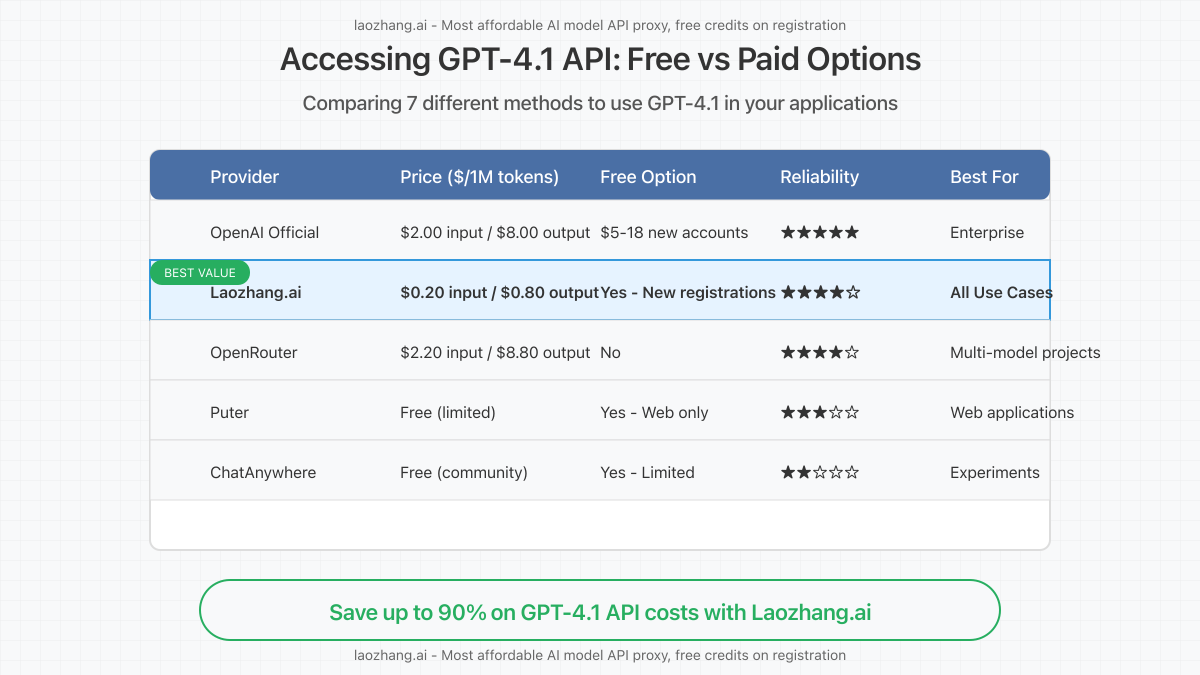
Understanding GPT-4.1 API Official Pricing
Before exploring free alternatives, it’s important to understand OpenAI’s official pricing structure for GPT-4.1:
| Model | Input ($/1M tokens) | Cached Input ($/1M tokens) | Output ($/1M tokens) |
|---|---|---|---|
| gpt-4.1 | $2.00 | $0.50 | $8.00 |
| gpt-4.1-mini | $0.40 | $0.10 | $1.60 |
| gpt-4.1-nano | $0.10 | $0.025 | $0.40 |
With the introduction of GPT-4.1-nano, OpenAI has made their advanced models more accessible, but developers still seek even more cost-effective solutions for testing and low-volume applications.
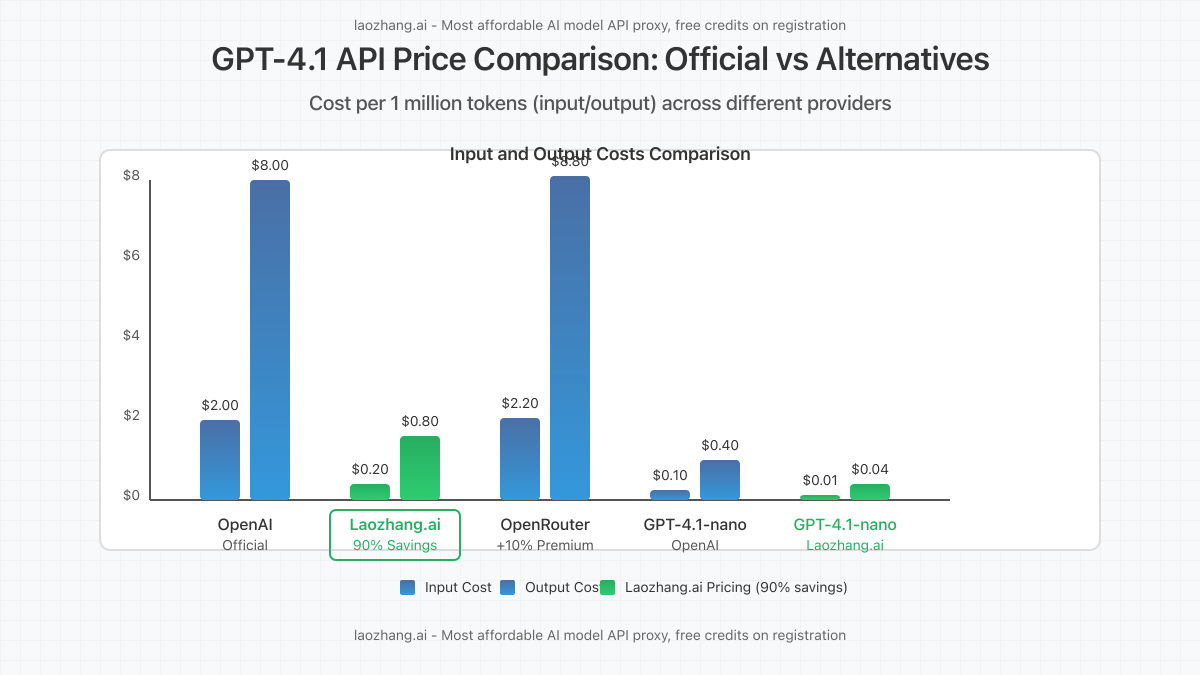
Method 1: OpenAI Free Credits for New Accounts
OpenAI offers $5-18 in free API credits for new accounts, which can be used with GPT-4.1 models:
- Sign up for a new OpenAI account at platform.openai.com
- Complete the verification process
- Access the free credits in your account dashboard
- Create an API key and start testing with GPT-4.1-nano for maximum token efficiency
Important: Free credits expire after 3 months, and this method can only be used once per payment method.
Method 2: Laozhang.ai API Forwarding Service
Laozhang.ai offers one of the most reliable and cost-effective solutions for accessing GPT-4.1 API, with significant discounts compared to official pricing:
- Up to 90% cost reduction compared to official OpenAI pricing
- Free credits for new registrations
- Stable connection with global edge node acceleration
- Compatible with standard OpenAI API format (drop-in replacement)
- Supports all GPT-4.1 variants including nano, mini, and standard
How to Get Started with Laozhang.ai:
- Register at api.laozhang.ai
- Get your API key from the dashboard
- Replace the OpenAI API endpoint in your code with Laozhang.ai’s endpoint
Sample API Request:
curl -X POST "https://api.laozhang.ai/v1/chat/completions" \
-H "Content-Type: application/json" \
-H "Authorization: Bearer $API_KEY" \
-d '{
"model": "gpt-4.1",
"stream": false,
"messages": [
{
"role": "user",
"content": [
{
"type": "text",
"text": "Generate a short poem about AI"
}
]
}
]
}'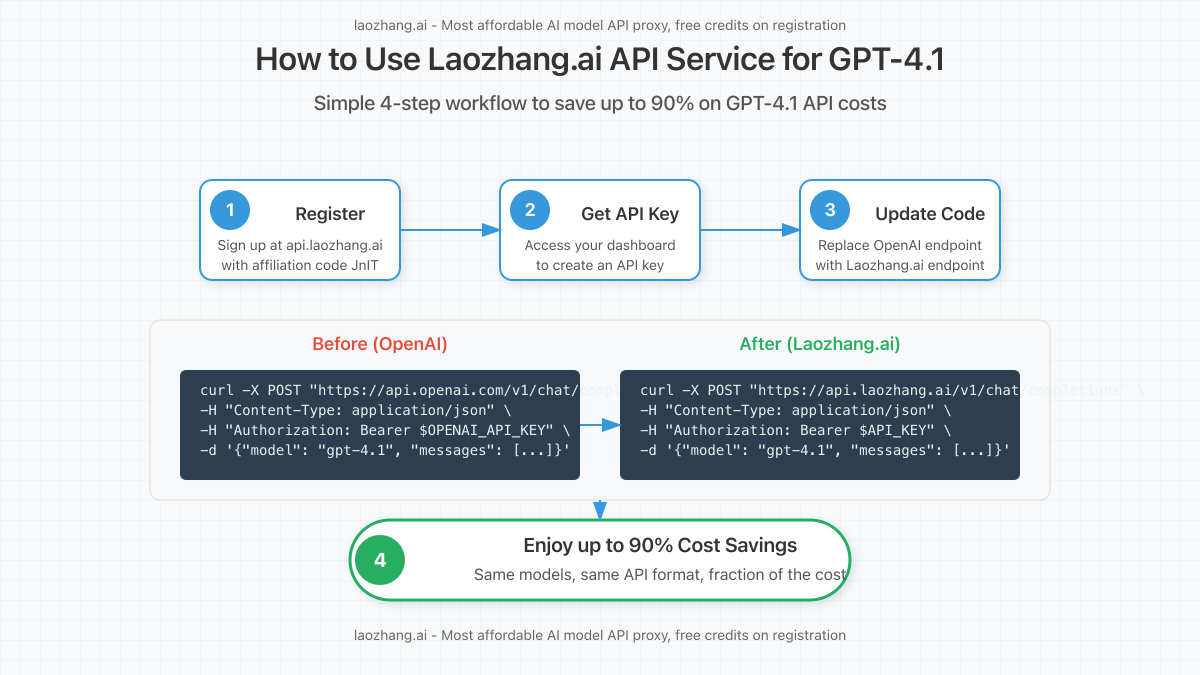
Method 3: OpenRouter’s Pay-Per-Request Model
OpenRouter provides access to GPT-4.1 without subscription fees, following a pay-per-request model:
- Create an account at openrouter.ai
- Add funds to your account (minimum $1)
- Generate an API key
- Use their endpoint for GPT-4.1 access
OpenRouter charges a small premium over OpenAI’s rates but offers additional benefits like fallback options and centralized billing across multiple AI providers.
Method 4: Puter’s Free API for Web Applications
Puter offers developers free access to OpenAI capabilities including GPT-4.1 through their JavaScript SDK:
- Completely free for web applications
- No API key required
- Usage limits apply, but sufficient for testing and low-volume applications
- End-users bear the cost in the production environment
Implementation Example:
// Include Puter.js in your web app
<script src="https://unpkg.com/puter@latest"></script>
// Use GPT-4.1 without an API key
const response = await puter.ai.chat({
model: "gpt-4.1-nano",
messages: [
{ role: "user", content: "What are the key features of GPT-4.1?" }
]
});Method 5: ChatAnywhere’s Community-Maintained Free API Keys
ChatAnywhere is an open-source GitHub project that provides community-maintained API keys for various AI models including GPT-4.1:
- Visit the ChatAnywhere GitHub repository
- Follow the instructions to obtain a free API key
- Use the provided endpoint with standard OpenAI API format
Note: Community-maintained keys may have usage limitations and occasional downtime. Not recommended for production applications.
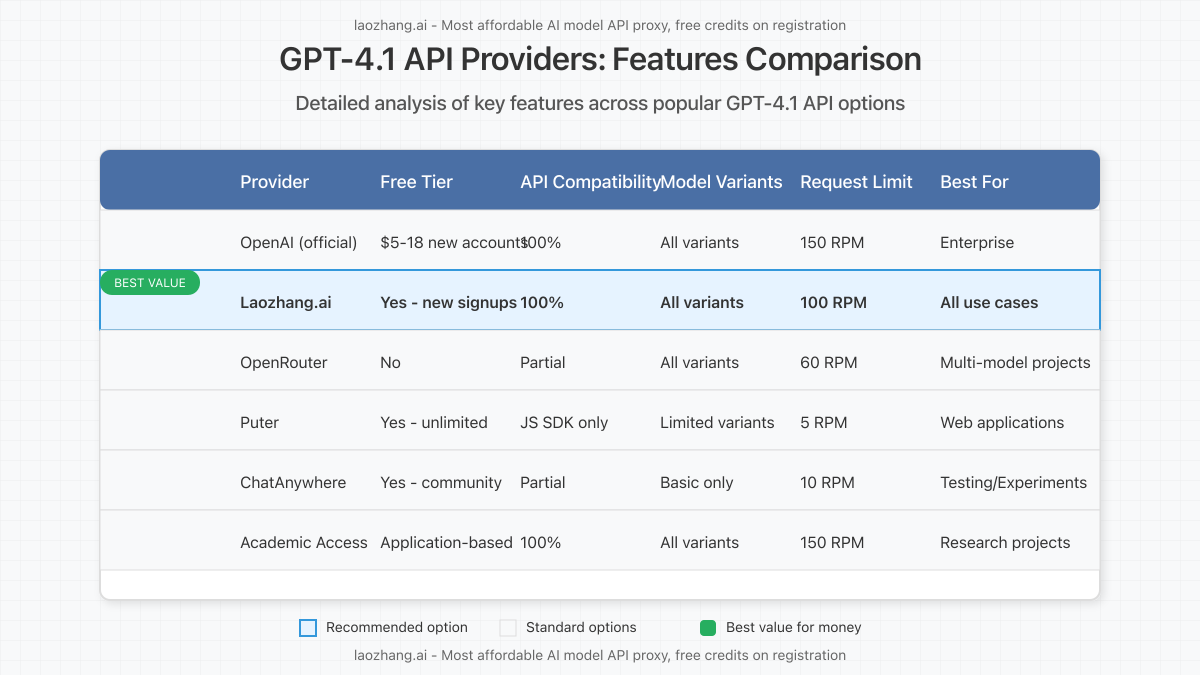
Method 6: Academic and Research Access Programs
OpenAI offers special programs for academic researchers and educational institutions:
- Visit OpenAI’s Academic Access page
- Submit an application with your research proposal or educational credentials
- If approved, receive free or heavily discounted API credits
This approach is best suited for legitimate research projects and educational purposes, with detailed documentation requirements.
Method 7: Startup and Developer Programs
Various accelerators and startup programs offer free OpenAI credits as part of their benefits package:
- Microsoft for Startups: Up to $25,000 in Azure credits that can be used for Azure OpenAI Service
- Y Combinator: Offers OpenAI credits to portfolio companies
- Hugging Face Startup Program: Includes various AI credits and resources
These programs require applications and usually have specific eligibility criteria focused on innovative startup businesses.
Which Method is Best for You?
| Method | Best For | Limitations | Setup Complexity |
|---|---|---|---|
| OpenAI Free Credits | Quick testing | One-time use, expires | Very Low |
| Laozhang.ai | Long-term production use | None (paid after free credits) | Low |
| OpenRouter | Multi-model applications | Slightly higher costs | Low |
| Puter | Web applications only | Limited to browser contexts | Medium |
| ChatAnywhere | Experimental projects | Reliability issues | Medium |
| Academic Access | Research projects | Application process | High |
| Startup Programs | Qualifying startups | Eligibility requirements | High |
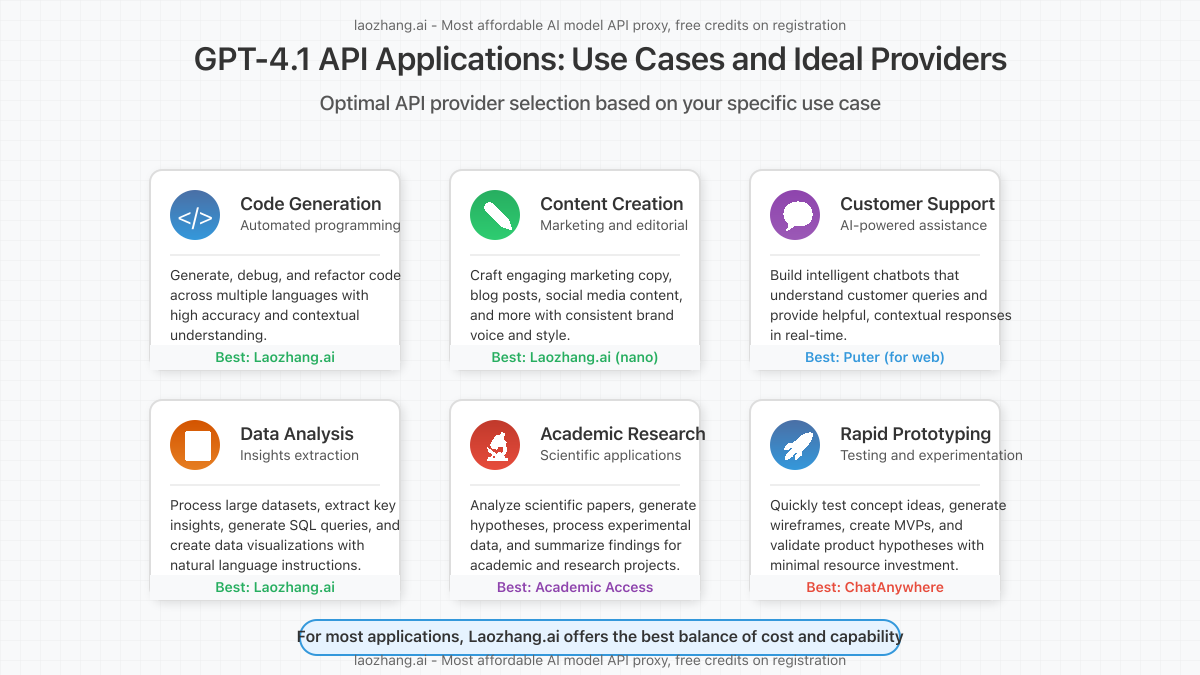
Maximizing Your Free GPT-4.1 API Usage
Regardless of which method you choose, these strategies will help you get the most from your free or discounted GPT-4.1 API access:
- Use GPT-4.1-nano for most tasks – it’s significantly cheaper while retaining core capabilities
- Implement caching to take advantage of OpenAI’s 75% discount on cached requests
- Optimize prompt engineering to reduce token usage while maintaining output quality
- Set strict token limits for outputs to prevent unexpected charges
- Monitor usage with detailed logging and analytics
Conclusion: The Best Path Forward
After analyzing all available options, Laozhang.ai emerges as the most balanced solution for most developers seeking affordable access to GPT-4.1 API. It combines reliability, significant cost savings, and compatibility with standard OpenAI API format, making it ideal for both testing and production environments.
Ready to start using GPT-4.1 API at a fraction of the official cost? Register at Laozhang.ai and get free credits to test the service. For additional support, contact directly via WeChat: ghj930213.
Frequently Asked Questions
Is there a completely free, unlimited GPT-4.1 API?
No legitimate service offers completely unlimited free access to GPT-4.1. Services offering free tiers have usage limits, and those that appear unlimited typically have hidden costs, reliability issues, or are violating OpenAI’s terms of service.
How does GPT-4.1-nano compare to the full GPT-4.1?
GPT-4.1-nano is a smaller, more efficient model that retains core capabilities while sacrificing some complexity and nuance. It’s suitable for most everyday tasks at 95% of the quality but 5% of the cost of full GPT-4.1.
Are API forwarding services like Laozhang.ai legal?
Yes, legitimate API forwarding services operate as authorized resellers, purchasing capacity in bulk and reselling at a discount. Laozhang.ai maintains proper licenses and agreements with model providers.
Can I use these methods for commercial applications?
Methods like Laozhang.ai, OpenRouter, and (after free credits) OpenAI are suitable for commercial applications. Community-maintained keys and some free options may have terms restricting commercial use.
How frequently does GPT-4.1 API pricing change?
OpenAI typically updates pricing every 6-12 months, with a trend toward lower prices as technology improves. Third-party providers like Laozhang.ai often adjust their pricing to remain competitive.
What’s the difference between cached and standard input pricing?
Cached pricing applies when you send the same input messages multiple times. OpenAI recognizes repeated patterns and charges 75% less for these identical inputs, helping optimize costs for repetitive tasks.